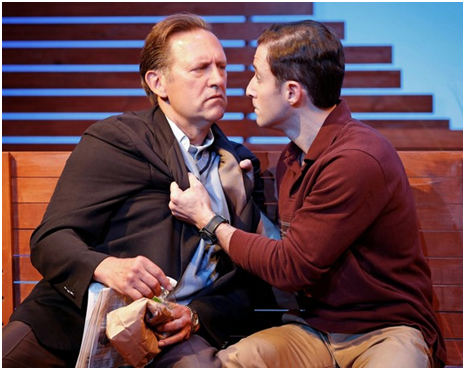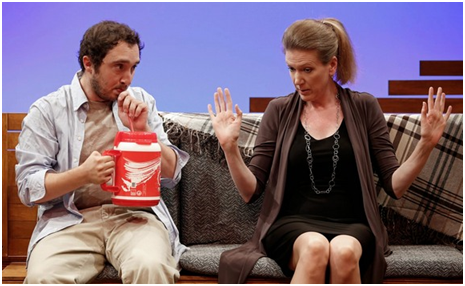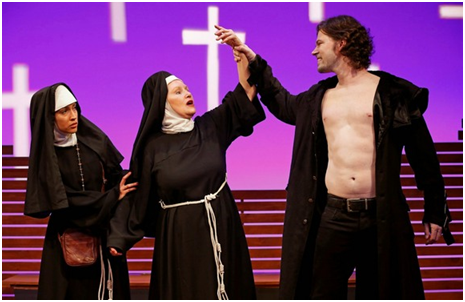Summer Shorts: Series B

Victor Slezak and J.J. Kandel in a scene
from Neil LaBute’s “The Mulberry Bush”
(Photo credit: Carol Rosegg)
The three new American one acts in Series B of this year’s Summer Shorts all contain characters with emotional or mental issues not in the mainstream but that they do not see as problems. The most successful of these is Neil LaBute’s ironic, “The Mulberry Bush.” Bill eats lunch each day on a promontory in a park overlooking where the children play. Quietly unassuming and seemingly harmless, Bill is approached by a stranger he doesn’t know. Kip introduces himself and apparently knows all about Bill. Little by little, he makes accusations that Bill refutes. Finally Kip threatens to do Bill bodily harm. The revelations on both sides are devastating. Reminiscent of Edward Albee’s The
Zoo Story, “The Mulberry Bush” has been directed by Maria Mileaf in a leisurely style which undercuts the tension in the encounter. However, Victor Slezak as the older Bill and J.J. Kandel as the angry, threatening Kip are excellent as they reveal the lives of these two very different characters by degrees leading up to the startling denouement. This is a rewarding piece of theater and a new departure for LaBute, a Summer Shorts regular.

Will Dagger and Henny Russell in a scene
from Daniel Reitz’s “Napoleon in Exile”
(Photo credit: Carol Rosegg)
Daniel Reitz’s “Napoleon in Exile” is an all-encompassing study of an autistic young man unable to cope with reality. Will Dagger’s performance as the 25-year-old Corey who spends all day at home playing Minecraft games on his laptop after having been fired from his dead end job goes beyond acting in its authenticity. The play’s crisis occurs when Corey’s mother Evelyn reveals that she has cancer and that it is imperative that he learn to cope for himself. Although “Napoleon in Exile” is a brilliant character study, the play fails to develop beyond its depiction living with autism on a daily basis and in the end we are right back where we were at the beginning. Henny Russell as his understanding mother who is at the end of her rope exhibits the kind of intellectual cool one needs to have to live with a person suffering from acute autism. While director Paul Schnee has obtained remarkable performances from his two actors, he has not helped the play find its arc or avoid a great deal of repetition.

Tasha Guevara, Brenda Currin and Dana Watkins
in a scene from Alberto Innaurato’s “Doubtless”
(Photo credit: Carol Rosegg)
The third play and the longest makes up the second half of the evening. “Doubtless” marks the return of playwright Alberto Innaurato (Gemini, The Transifiguration of Bebo Blimpie, Ulysses in Traction, Passione, and Gus and Al) to the New York theater scene after an absence of 25 years. Unfortunately, “Doubtless” is not an occasion for cheering. In fact, it is both embarrassing and an embarrassment. Though obviously an anti-Catholic diatribe, this attempt to satirize John Patrick Shanley’s Doubt owes more to the comedies of Christopher Durang and Charles Busch such as “Sister Mary Ignatius Explains It All to You” and The Divine Sister without understanding what makes those plays work.
While an orgy goes on offstage in a Catholic complex in New York City, Mother Superior and a younger nun await a Father and a Brother to give them the keys to the Bishop’s car so that they can run away to live together as a committed couple. However, we have already seen the priests running off to join the orgy so that we know they are otherwise occupied. While the women condemn the Catholic Church for its unfairness to women, particularly nuns, a coffin opens and Jesus Christ dressed as Dracula covered in glitter emerges. Taken with the younger nun, he wants to get to know her better while she uses his taste for pop culture to ward him off. When the two priests finally return to put things right, it is obvious that they have been indulging their own tastes in the unseen orgy.
Aside from the many anti-Catholic jibes that will make some members of the audience uncomfortable, the play is loaded with pop culture references (The King and I, Debby Harry, Meryl Streep in Doubt, Last Tango in Paris, Sigourney Weaver in Alien, Brigadoon, Judi Dench, West Side Story, as well as snatches of songs from the aforementioned musicals) but they are delivered in a scattershot fashion which undercuts the play’s themes of bigotry and corruption. Ultimately, the play is not a persuasive candidate for calling on the church to accept homosexuals and lesbians among its ranks.
Jack Hofsiss, the Tony Award-winning director of The Elephant Man, keeps the acting reined in while the dialogue becomes more and more blasphemous. Veteran actress Brenda Currin makes the discontented Mother Superior a believable character but the other four performers seem to be asked to posture rather than put any faith in their roles. The three male actors in varying states of undress reveal very attractive physiques but turn the play into a travesty rather than a satiric statement on the narrowness of church teachings on social issues.
Rebecca Lord-Surratt’s unit setting, also used in Series A, with its wooden slats and sky blue backdrop works well for each of the three plays with the addition of some suitable pieces of furniture. Meghan Healey’s costumes are suitably realistic for two of the plays, intentionally comic for the third. The lighting by Greg MacPherson always focuses attention center stage as it should be.
Summer Shorts: Series B is a potpourri of plays on extreme anti-social behavior from severe autism to clergy who wish to sleep with each other while still under their vows of chastity. The plays vary from a very successful one to a total failure, but like the proverbial smorgasbord, there is something for everyone, in style, theme or content.
Summer Shorts: Series B (in rotating repertory with Summer Shorts: Series A through August 30, 2014)
59E59Theaters, 59 East 59th Street, west of Park Avenue, in Manhattan
For tickets or information, call 212-279-4200 or visit http://www.59e59.org
Running time: two hours including one intermission

Leave a comment